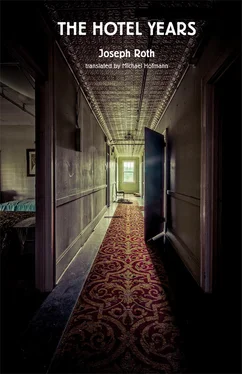Joseph Roth - The Hotel Years
Здесь есть возможность читать онлайн «Joseph Roth - The Hotel Years» весь текст электронной книги совершенно бесплатно (целиком полную версию без сокращений). В некоторых случаях можно слушать аудио, скачать через торрент в формате fb2 и присутствует краткое содержание. Год выпуска: 2015, Издательство: New Directions, Жанр: Прочая документальная литература, Прочая документальная литература, Культурология, Классическая проза, на английском языке. Описание произведения, (предисловие) а так же отзывы посетителей доступны на портале библиотеки ЛибКат.
- Название:The Hotel Years
- Автор:
- Издательство:New Directions
- Жанр:
- Год:2015
- ISBN:нет данных
- Рейтинг книги:3 / 5. Голосов: 1
-
Избранное:Добавить в избранное
- Отзывы:
-
Ваша оценка:
- 60
- 1
- 2
- 3
- 4
- 5
The Hotel Years: краткое содержание, описание и аннотация
Предлагаем к чтению аннотацию, описание, краткое содержание или предисловие (зависит от того, что написал сам автор книги «The Hotel Years»). Если вы не нашли необходимую информацию о книге — напишите в комментариях, мы постараемся отыскать её.
Frankfurter Zeitung
The Hotel Years — читать онлайн бесплатно полную книгу (весь текст) целиком
Ниже представлен текст книги, разбитый по страницам. Система сохранения места последней прочитанной страницы, позволяет с удобством читать онлайн бесплатно книгу «The Hotel Years», без необходимости каждый раз заново искать на чём Вы остановились. Поставьте закладку, и сможете в любой момент перейти на страницу, на которой закончили чтение.
Интервал:
Закладка:
It’s as though the inhabitants of the cities were outdistanced by the wisdom and the aspirations of the cities themselves. Things have a better feeling for the future than people do. People feel historically, i.e. retrospectively. Walls, streets, wires, chimneys feel prospectively. People get in the way of progress. They hang sentimental weights on the winged feet of time. Each one wants his own church tower. In the meantime chimneys grow over the heads of church towers. The smoke eats up the sound of bells. It swaddles them in its black wool, so that they cannot be heard, much less told apart. Each city has its theatres, its monuments, its museum, its history. But none of these things has any lasting resonance. For historical or so-called cultural things live off the echo that sustains them. Here though is no room for echo and resonance. The sounds of bells live from echo, and they all fight each other, until the smoke comes along and chokes them.
Some of the smaller towns here have their old gabled romantic parts. These are referred to as idyllic. Time drones all round them. Busy wires enmesh them. All the trembling airwaves are full of the radio-borne words of the present. What is the point of these slumbering nooks, these dreamy beauties? While there was a blue sky over them they were in their element, but now grey smoke hangs over them. They are buried under billions of dust and carbon particles. They will never experience a resurrection. Never will a pure naked sunbeam gild them. Never will a pure rain rinse them clean. Never will an actual cloud lend them shade. In all their fixity they are doomed. They were built for the ages in lasting stone, and their durable construction is the only reason they still exist now. Not because they have any force or presence. They are like old silver coins that have no value as currency. The flimsiest banknote is more actual.
It is of just such ridiculous thin material that the new parts of cities are built. There are walls you can pinch between finger and thumb. There are tenements of wood and hollow brick. There are shingle roofs that children might have draped. Things stand and fall and are rebuilt. Moments ago they were white and gleaming with fresh paint. Now they are black as rotten teeth. Each street a gaping mouth.
People live here. People with ambitions and desires. Even the unemployed. They step out. Why hang about? What is there to see here? Children play in the middle of the streets. All the windows are identical. All the doors are identical. Only the numbers on them are different. All the people are grimly determined to reach their destination. Perhaps it is the dole office. Perhaps the co-op. Perhaps it is a meeting hall. Perhaps a break-in. Perhaps the revolution. Perhaps it is the cinema.
Oh, but it matters so little! One destination is like the other. One city like the next. Each street like the next. Climb on the tram. In half an hour you’ll be in the next place. Is there any difference? Smoke over the world! You go to Oberhausen, and then Mülheim, and then to Recklinghausen, to Bochum, to Gladbeck, to Buer, to Hamborn, to Bottrop. Smoke over the world! No sky, no clouds. Rain precipitated from smoke: black rain. A hundred chimneys, so many fingers, pillars of the smoke sky, altars of the Almighty Smoke. Rails along the ground, corresponding wires through the air. All one grim city made of stacks of city, of bundles of towns. In amongst it all runs the abstract provincial boundary. But overhead is the uniform sky, and that is smoke, smoke, smoke.
Frankfurter Zeitung, 18 March 1926
10. Germany in Winter
There is something half-hearted about this winter. The calendrical harshness of nature is nothing to the boundless cruelty of history. Snow melts away a couple of hours after falling. A mild zephyr blows over the land. There is a relation between the desires and the fears of the hungry, the cold, the unshod and the unclothed, and the permanent laws of the changing seasons. God’s fist has never oppressed us so much; the hand that doles out frost and bitterness every year was never so mild. There is some compensatory mechanism.
I come from abroad, where they pack up mercy parcels for Germany’s army, and where the newspapers mount withering attacks on German politicians on their front pages, but their back, human pages stick up for German victims; where the window displays of banks and exchange parlours exhibit endless Reichsmark notes, not as negotiable objects of exchange, but as curiosities; where Germany’s best actors appear, not for fame, but for rustling currency; where the money still has a good oily sheen, and feels soft and smooth in the hand, as though coloured by the sacred, kingly fat of the Golden Calf.
But in this abroad the station-guard goes hungry, the trains come and go unpunctually, the heating doesn’t always work, the porters haggle, the toilets don’t flush, and the lighting in the compartments is wretched. Whereas in Germany railway carriages are full of embittered businessmen, and a hungry inspector checks your tickets — but the heating works, and a beaming lamp, worthy of a nice sitting room, sheds its light. The porters certainly have set fees. The timetable isn’t a work of fiction. The trains actually stick to it. Officials man the counters. Water flows into the WCs. The machinery of public life is well and dependably oiled. In the cities, busy brooms whisk canine excrement into purpose-built gutters. Outside food shops stands the tidy rank and file of the great army of hungry Germans.
In Leipzig I saw a man from a firm of undertakers. He wore a gleaming top hat. He had a pomaded, uptwirled black moustache. He looked like a first-class funeral. He provoked fear and respect. Round about him blew gusts of eternity. He was a representative intercessor between this world and the next; a Middle European Charon; a splendidly ceremonial death. Only — he wasn’t riding on a calèche drawn by a couple of black stallions, or in a black-lacquered automobile, not even on a tramcar; nor was he on shanks’s pony. This awe-inspiring figure was mounted — on a bicycle. He pedalled. He pedalled to the cemetery and back. He sat hunched over the handlebars, and pedalled for all he was worth. His sinister black trousers bore shiny metal clips, and were bunched at the ankles, looking like umbrellas in fair weather. This distinguished apparition couldn’t afford a tram ticket. All his metaphysical dread was wasted. It wasn’t possible to have any respect for this agent of eternity — not on a bicycle. If I had been a corpse awaiting burial, this undertaker would have taken away all my fear of the coming assizes.
Then, in Chemnitz station, I saw a conductor eating chocolates. He had found the rest of a box of pralines in a compartment. The conductor was a gentleman in what they call the “best years”, big, hairy fists, a square head, a short, squat body, and big, solid, waterproof boots. This man was wolfing down frivolous liqueur-filled confectionery, and lost all the gravity he was supposed to have as an aspect of his profession. The conductor was eating a young ladies’ cinema nibble with a rigid, humourless expression, as though it was the doorstop or hunk of sausage that would have accorded with his personality. Six months ago, this conductor certainly wouldn’t have been tucking into chocolates. But today he is hungry. What to a passenger was a frippery, to him is a necessity. If it had been a dry crust of bread he had picked up — the effect couldn’t have been more abject. Things in Germany are at such a pass that its railway conductors help themselves to expensive fripperies in their desperation. One party carelessly leaves them behind, to the other they’re a lifesaver. That’s where Germany is right now.
In Dresden I spoke to a policeman. I slipped him five Czech crowns, and they loosened his tongue. All his personal and professional grimness disappeared. A week ago, he had no money at all. He was out of work. Unemployment support wasn’t enough. He picked up a rucksack and went out into the country — to beg. A farm dog ripped his last pair of trousers. He patched them — with rope, for want of thread. The stout rope had the effect of widening the tear in the trousers. Before long, the policeman will go around clad in a rope.
Читать дальшеИнтервал:
Закладка:
Похожие книги на «The Hotel Years»
Представляем Вашему вниманию похожие книги на «The Hotel Years» списком для выбора. Мы отобрали схожую по названию и смыслу литературу в надежде предоставить читателям больше вариантов отыскать новые, интересные, ещё непрочитанные произведения.
Обсуждение, отзывы о книге «The Hotel Years» и просто собственные мнения читателей. Оставьте ваши комментарии, напишите, что Вы думаете о произведении, его смысле или главных героях. Укажите что конкретно понравилось, а что нет, и почему Вы так считаете.












